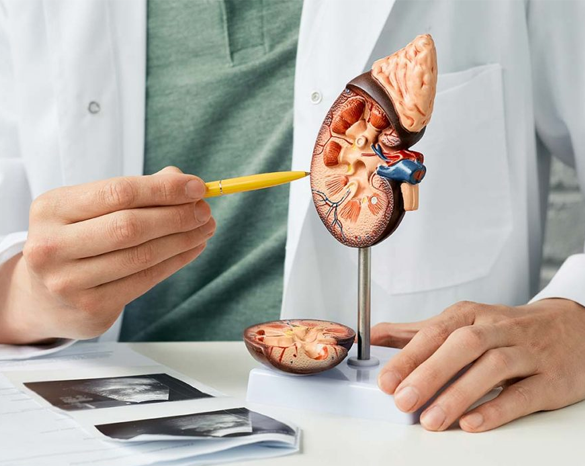
Urinary incontinence (UI) is the involuntary leakage of urine, which can occur during activities like exercise, sneezing, or even at rest. This condition can be distressing, leading to embarrassment and social withdrawal. Although it is more common in older adults, urinary incontinence can affect individuals of all ages and genders.
Dr. Milind Bapat, a leading Urinary Incontinence Specialist in Pune, is dedicated to helping patients effectively manage and overcome this condition. With 32 years of experience in urology, he combines extensive knowledge with compassionate care to provide.
Symptoms of urinary incontinence include leaking urine during activities like coughing, sneezing, or laughing (stress incontinence), a sudden urge to urinate leading to involuntary leakage (urge incontinence), inability to hold urine without warning, frequent urination, including at night, bed-wetting during sleep (nocturnal enuresis), leakage during sexual activity, and inability to reach the toilet in time.
Dr. Milind Bapat offers a personalized approach to treating urinary incontinence, utilizing a variety of effective options
1. Lifestyle Modifications:
● Dietary Changes : Reducing caffeine and alcohol to minimize bladder irritation.
● Pelvic Floor Exercises : Kegel exercises to strengthen pelvic muscles.
● Bladder Training : Scheduled bathroom visits to increase the time between urination.
2. Medications:
● Anticholinergics : To reduce bladder spasms.
● Beta-3 Agonists : To relax the bladder muscle and increase capacity.
● Duloxetine : An antidepressant that improves muscle tone in the urethra.
● Botulinum Toxin A (Botox) : Injected to relax bladder muscles.
3. Medical Devices:
● Pessaries : Devices to support the bladder in women.
● Catheters : To assist with draining the bladder in overflow incontinence.
4. Surgical Options:
● Sling Surgery : A mesh material placed under the urethra to prevent leakage.
● Artificial Urinary Sphincter : A device implanted in men to help control urination.
● Bladder Augmentation : Surgery to increase bladder capacity.
5. Other Treatments:
● Electrical Nerve Stimulation : Uses mild electrical pulses to stimulate bladder control nerves.
Urology is a surgical specialty which deals with diseases of the male and female urinary tract and the male reproductive organs. Although urology is classified as a surgical specialty, a knowledge of internal medicine, pediatrics, gynecology and other specialties is required by the urologist because of the wide variety of clinical problems encountered. In recognition of the wide scope of urology.
Dr.Milind Bapat, Best Urologist in Pune has specialized skills and knowledge regarding problems of the male reproductive organs and the male and female urinary tract. Due to the variety of clinical problems encountered, knowledge of internal medicine, gynecology, pediatrics, and other specialties is required of the urologist. Urologists also perform surgeries on patients when required. The organs that urologists treat are the kidneys, urethra, urinary bladder, male productive organs, and uterus. There are also urologists that focus on a specific specialty area, and these include pediatric urology, male infertility, and urologic oncology.
Urologists work in the specialized area of urology, and they perform examinations of the urinary tract and reproductive organs in order to diagnose diseases, infections, cancer, and disorders. Urologists are needed to do surgeries sometimes to take out the kidney stones and other obstructions in the urinary tract which may be causing symptoms in patients. If a patient is exhibiting signs of incontinence or other issues of the urinary system, they are sent to a urologist for a further examination. Urologists treat and diagnose patients with interstitial cystitis, enlarged prostates, overactive bladder, and prostatitis.
The word “urologic diseases” describes a wide range of conditions, all connected to the filtering and carrying of urine out of the body. These diseases may affect women, men, and children. In males, they affect the urinary tract or the reproductive organs. In females, they involve the urinary tract.
● Urinary incontinence
● Prostate cancer
● Benign prostatic hyperplasia
● Bladder cancer
● Interstitial cystitis
● Calculus
● Kidney cancer
● Prostatitis
● Overactive bladder
● Hematuria
● Urinary Tract Infection (UTI)
● Lower urinary tract symptoms
● Peyronie’s disease
● Male infertility
● Hypospadia
● Cryptorchidism
● Neurogenic bladder dysfunction
● Vesicoureteral reflux
● Urinary retention
● Varicocele